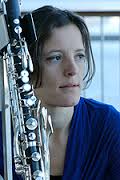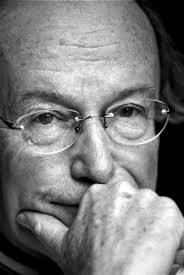Wat zou het einde van een jaar zijn zonder favorietenlijstjes? Daarom hierbij mijn keuze van de drie mooiste cd’s/dvd’s van 2014.
1. Unsuk Chin: 3 Concertos
De Koreaans-Duitse Unsuk Chin geldt als een van de belangrijkste componisten van onze tijd. Zij werd vele malen onderscheiden, onder andere met de prestigieuze Grawemeyer Award (2004) en de niet minder belangwekkende Zuid-Koreaanse Ho-Am prijs (2012).
Op deze cd van Deutsche Grammophon presenteert het Seoul Philharmonic Orchestra onder leiding van Myung-Whun Chung drie concerten, voor piano, cello en sheng. Hoe verschillend deze ook zijn, er is één constante: Chins hang om ernst en vertier met elkaar te mengen.
In het Pianoconcert uit 1997 plaatst de solist (Sunwook Kim) nu eens oneindig rappe, virtuoze partijen tegenover een al even levendig agerend orkest, dan weer dromerige melodieflarden tegen een statisch orkestraal klankveld.

Die zinsbegoochelende sfeer is nog sterker aanwezig in het in 2009 gecomponeerde Šu, voor sheng en orkest. Dit Chinese mondorgel is qua klank enigszins verwant aan de westerse accordeon en Chin benut de bezwerende kracht hiervan optimaal. De vermaarde shengspeler Wu Wei vertolkt zijn vaak glisserende, lang aangehouden motieven met bewonderenswaardige beheersing. Het orkest ontpopt zich gaandeweg tot een soort supersheng, die de solist ondersteunt en aanvult, maar een enkele keer ook de macht tracht over te nemen met luidruchtige slagwerkpassages.
Het voor de Duitse cellist Alban Gerhardt gecomponeerde Celloconcert (2009/revisie 2013) haakt aan bij het pansori, een Koreaanse theatertraditie waarin gesproken en gezongen passages elkaar afwisselen. In het openingsdeel begint de cello met intens lyrische melodielijnen, gepuncteerd door korte uitroepen van het orkest. Hierna wordt naar een duivelse climax toegewerkt, waarin Gerhardt ultrasnelle loopjes over het hele spectrum van zijn instrument produceert zonder ook maar een moment van de wijs te raken. Het concert eindigt met dezelfde verdroomde sfeer als waarmee het begon. Alle stukken worden voorbeeldig uitgevoerd, de cd is een must-have voor liefhebbers van Chin
2. Fie Schouten: Ladder of Escape 11
Chin is ook vertegenwoordigd op de solo-cd Ladder op Escape 11, die basklarinettist Fie Schouten uitbracht op het label Attacca. Dankzij bemiddeling van ondergetekende kreeg zij toestemming van Chin om een fragment uit haar opera Alice in Wonderland als solo uit te voeren. Dit leidde tot het acht minuten durende Advice from a Caterpillar. Het is een aanstekelijk stuk, waarin de grilligheid van de duizendpoot wordt gevangen in avontuurlijke en geestige capriolen van de basklarinet. Hectische, springerige lijnen, diep gegrom en schelle uithalen roepen een toverland op waar dieren praten en mensen moeten luisteren. Schouten speelt met grote trefzekerheid en schakelt moeiteloos tussen lyrische en meer agressieve passages.
Prachtig is ook Article 7, seven ways to climb a mountain van Rozalie Hirs, waarin langzame en snellere melodieën en trillers in steeds wisselende registers worden ingebed in een elektronische soundscape. Die creëert met zijn lang uitgesponnen, zachtjes dalende en stijgende gejoel een welhaast verontrustend contrapunt ten opzichte van de klarinetpartij, vooral wanneer er interferenties van kwarttonen ontstaan met de boventonen.
Ook in de stukken van Mauricio Kagel, Robin de Raaff en Karlheinz Stockhausen betoont Schouten zich een waardige opvolger van haar docent Harry Sparnaay. Als een ware rattenvanger van Hamelen neemt zij je mee op een fascinerende reis langs alle denkbare klankkleuren en emotionele sferen die een basklarinet kan oproepen.
3. Hans Kox: Die Todesfrau
De componist Hans Kox was lange tijd uit de gratie, omdat hij weigerde atonale en seriële muziek te componeren. Wars van de mores van zijn tijd bleef hij zijn eigen stijl ontwikkelen, die voortborduurt op de muziektraditie zonder te vervallen in welke neostijl dan ook. Deze eveneens bij Attacca verschenen cd/dvd illustreert goed hoe expressief zijn toontaal is.
Die Todesfrau voor drie solostemmen, kamerkoor, fluit en cello is van een aangrijpende schoonheid. Kox liet zich hiertoe inspireren door de novelle Das Gericht des Meeres van Gertrud von le Fort en schreef zelf de tekst, samen met Jan van der Lugt. De dramatische legende gaat over schuld en vergeving. Anne, die met een slaaplied de dood kan bewerkstelligen, kiest ervoor het kind van de moorddadige koningin te sparen en zelf te verdrinken.
Die Todesfrau roept een staalkaart van emoties op. Weemoedige melodieën van de solisten worden afgewisseld met verontruste uitroepen van het koor. Evocatieve lijnen van fluit en cello lijken het golven van het water te verbeelden. Soms klinken verzoenende harmonieën, dan weer roept het prevelende koor de sfeer op van een seance, waarin de aanwezigen hun angsten lijken te willen bezweren.
Doordat Kox veel stilte inlast en bovendien de solisten vaak slechts door één enkel instrument laat begeleiden, ontstaat een enorme ruimtelijkheid. Soms ook wordt de tekst gesproken, wat een nog intiemere sfeer oproept. Helaas laat het Duits van bariton Kees Jan de Koning op dit soort momenten nogal te wensen over. Verder wordt dit gevarieerde, mooi samenhangende werk voorbeeldig uitgevoerd door de fluitiste Abbie de Quant, de celliste Pamela Smits en het Nederlands Kamerkoor onder leiding van Klaas Stok. Ook Lalage’s Monologues and the Gedächtnislieder zijn zeer de moeite waard. Als bonus is een dvd bijgevoegd met een informatieve documentaire over Hans Kox van Arjen Vlakveld en Henk van der Meulen.
Ik wens u een fijne kerstvakantie, boordevol luister- en kijkplezier!


